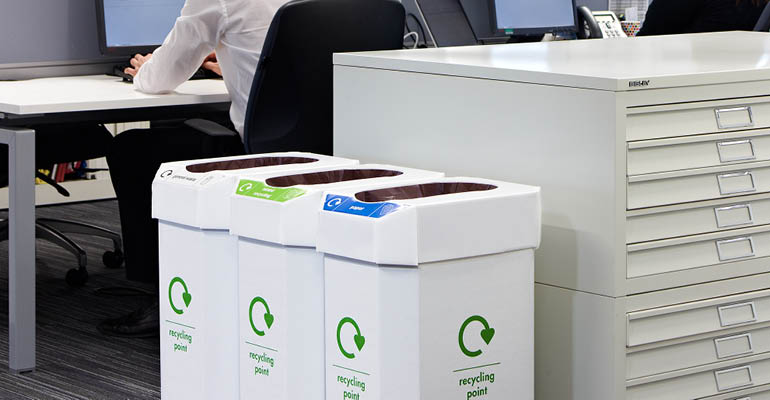A property may be owned by one entity, managed by another and have many tenants.

For years, municipalities around the country have banned or restricted landfilling of office-generated waste, but that regulatory push has flown under the radar. Many businesses are uninformed of the laws and have no programs in place to manage waste.
This presents an opportunity for forward looking solid waste management companies. It’s not just an opportunity to pick up and haul recyclables, but also a chance to step in as educators and advisors.
The Center for EcoTechnology, a nonprofit facilitating business, government, and residential waste reduction services, has seen a flurry of activity in the business sector.
“A lot of employers want recycling programs for employee engagement. Their [people] recycle at home and want to recycle at work, so there’s that internal component,” says Lorenzo Macaluso, Center for EcoTechnology’s, director of client services. “But we have also seen an external component, where shareholders require companies to have sustainability practices; it’s a way they are evaluated. Recycling is a measurable way to show their efforts.”
Reaching the decision makers.
A property may be owned by one entity, managed by another and have many tenants. So when a hauler wants to win a contract there can be hoops to jump through just to reach the right decision maker.
Macaluso has seen this conflict resolved in one of two ways. Some motivated businesses contract with niche providers, and pay a premium for pickups. But more often waste management companies have a series of conversations with the main players, typically the property management team, to explain regulations and benefits.
“It’s providing the right information to the right decision makers, but finding them is challenging in large property management groups,” he says. “They are typically in another state and do not know what’s happening on the ground. Though once you’ve made that connection you can implement a lot of change in one shot.”
Leading customers to what they need.
Businesses want to do the right thing and often assume haulers are providing the necessary services. But this can be a problematic assumption.
“They say I want to recycle and the hauler drops off a cardboard bin, but the customer has a kitchen and a lot of mixed waste. You can end up with the wrong container type, the wrong pick up schedule; they may have needed dual-stream so now the waste becomes unrecyclable,” says Macaluso. “So communication over specific needs and service options is critical when deciding how to package services. … We can usually make it cost neutral or close. It takes … a savvy hauler who can … determine need, navigate changes in service levels and provide a good quote.”
Republic serves as recycling partner to thousands of businesses
“In our experience, really successful programs are simple,” says Peter Keller, vice president of recycling and sustainability at Republic Services. “They need to be convenient, efficient and tailored to a customer’s needs. Often, they incorporate ongoing education and awareness activities that are authentic to the organization. For example, education on acceptable recyclables, how items should be recycled … and why that matters.”
Republic offers branded BluePrint Waste Assessment to identify optimal service for the business, based on volume and material type.
Through Republic’s all-in-one office model, customers place recyclables into one container for pick up and Republic sorts the materials at its facilities. Though a common model amongst waste companies is to have customers sort in centralized areas and have custodial staff take it to compactors or loading dock areas.
The National Waste & Recycling Association (NWRA) is working to pull more municipalities into the picture.
“In some communities, the program ends with residents, but 40 to 60 percent of waste is from businesses,” says Steve Changaris, NWRA Northeast region manager. “So we are working with communities, state regulators and waste authorities. We want to make sure they focus on business recycling and see programs set up that work,”
Business opportunities expand when haulers look holistically at all types of trash.
Food waste in particular has been a catalyst for upgrading services or beginning programs. So being able to pair food and other materials to maximize diversion has been key.
“When you have a motivated customer … being able to provide comprehensive waste services as well as value added [such as education] gives an advantage. It’s not always just price that wins the contract,” says Macaluso.
About the Author(s)
You May Also Like




